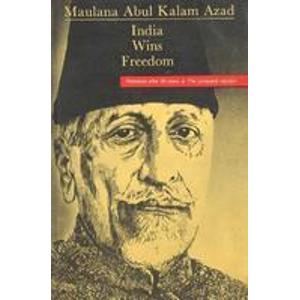Follow Us On:
(Author: Abul Kalam Azad)
Reviewed by Abdur Rahman
India wins freedom is a political autobiography of Maulana Abul Kalam Azad beginning with the introduction of the government of India act 1935 by the British India and the events leading to the partition of the Subcontinent. It consists of 283 pages covering sixteen chapters on major political developments and events in the history of undivided India after 1935.
Maulana Azad was born in Mecca in 1888 in a traditional religious family. His father moved to India from Makkah in 1890 along with the whole family and settled in Calcutta. Maulana was educated in the traditional system of education for Muslims in India. He was brilliant enough to get mastery in his learning at the age of sixteen. The traditional educational education did not satisfy him. Due to his revolutionary spirit he was able to break the chains of tradition and follow his own path of finding the truth. He was greatly impressed by the writings of Sir Syed Ahmad Khan on modern education. He also joined one of the revolutionary groups fighting against the British Raj.
The book under review gives us insight into the political life of Maulana Azad’s struggle for freedom. It also provides psychological insight into the minds of some of the important political personalities in the Congress high command. It presents one of the many sides of the picture in a hazy way.
The Gandhi’s picture drawn by Azad is somewhat authoritative and his line of thinking seems to be oscillating between two extremes. He would not agree to a view slightly deviating from nonviolence on important political issues, where the situation demanded a flexible attitude. Most of the Congress leadership, in the view of Azad’s narrative, would subordinate their judgments on important issues to adjust them to Gandhi’s stance in the end; Azad blames Gandhi for bringing Jinnah into the political scene allowing him to regain his lost position. It was mainly due to Gandhi‘s attitude towards Jinnah and addressing him as Quaid-i-Azam, that Indian Muslims considered him so. Azad blames Jinnah for the failure of the Simla conference, because he strongly objected to the inclusion of the two Muslims who were not his nominees, hence, depriving the Muslims to have seven representatives in the executive Council, despite the fact that Muslims constituted only 25 per cent of the total population. According to Azad there was a large bloc of Muslims who did not follow Muslim League in its demands.
Azad maintains that Jawahar Lal Nehru was particularly responsible for creating a gulf of suspicions between the Congress and the Muslim League and hence allowing the Muslim League to cling even rigidly for its demand of a separate homeland for the Muslims of the sub continent. He mentions specially two instances in which Nehru did not act responsibly. In the first instance, Nehru rejected the inclusion of two League ministers in the UP cabinet despite being promised them to be included. The other instance was the statement he gave in the press conference on July 10, 1946; about the Cabinet mission Plan, which disappointed Jinnah and League
Azad informs us that as Home minister, Sardar Patel was responsible for law and order situation in the wake of the communal riots after partition but failed to pay attention to the complaints that Muslims were being slaughtered in thousands.

